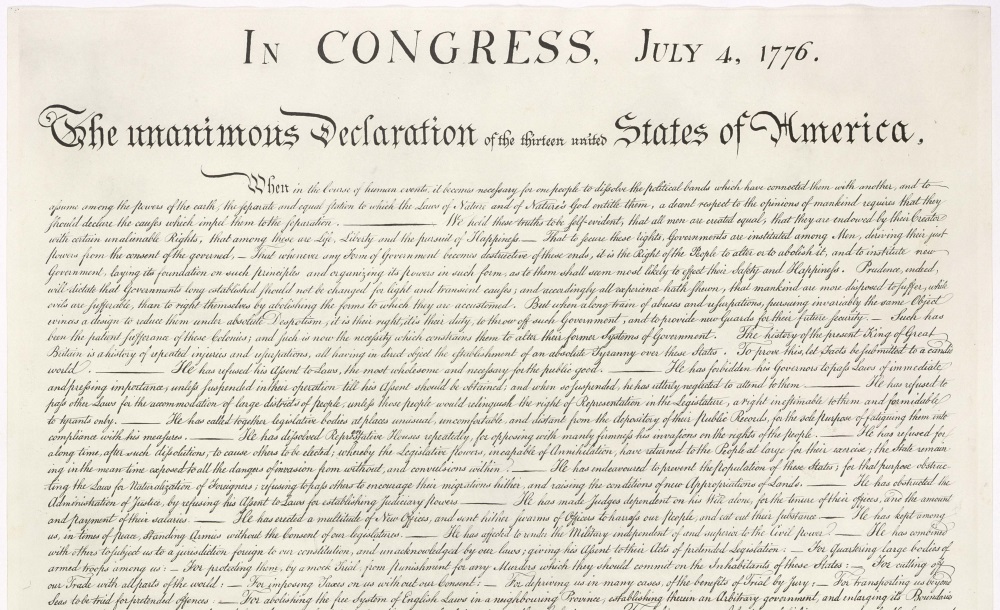American History | Modul 9 | Quellen untersuchen: Textquelle | Demokratie |◻◻◻ schwer | ca. 40 min | optionale vertiefende Aufgabe: 20 min
 Faksimile der Abschrift der Declaration of Independence von William Stone, 1823| Vollständiges Bild und Bildnachweis (Public Domain, Wikimedia): Bild anklicken
Faksimile der Abschrift der Declaration of Independence von William Stone, 1823| Vollständiges Bild und Bildnachweis (Public Domain, Wikimedia): Bild anklicken
The Declaration of Independence, mainly drafted by Thomas Jefferson, was adopted by the Continental Congress on July 4, 1776, and announced that the thirteen American colonies, then at war with Great Britain, regarded themselves as thirteen newly independent sovereign states, and no longer part of the British Empire. Instead they formed a new nation – the United States of America.
What were the central points that Jefferson wanted to make? Moreover, how did he imagine the society and government of the newly independent states?
Extract of the Declaration of Independence
|
In Congress, July 4, 1776. The unanimous Declaration of the thirteen United States of America, |
Im Kongress, 4. Juli 1776. Die einstimmige Erklärung der dreizehn vereinigten Staaten von Amerika, |
| When in the Course of human events, it becomes necessary for one people to dissolve the political bands which have connected them with another, and to assume among the powers of the earth, the separate and equal station to which the Laws of Nature and of Nature’s God entitle them, a decent respect to the opinions of mankind requires that they should declare the causes which impel them to the separation. | Wenn es im Gange menschlicher Ereignisse für ein Volk notwendig wird, die politischen Bande zu lösen, die es mit einem anderen Volk verbunden haben, und unter den Mächten der Erde den selbstständigen und gleichen Rang einzunehmen, zu dem die Gesetze der Natur und des Schöpfers der Natur es berechtigen, so erfordert eine geziemende Rücksicht auf die Meinung der Menschheit, dass es die Gründe darlegt, die es zu der Trennung veranlassen. |
| We hold these truths to be self-evident, that all men are created equal, that they are endowed by their Creator with certain unalienable Rights, that among these are Life, Liberty and the pursuit of Happiness. That to secure these rights, Governments are instituted among Men, deriving their just powers from the consent of the governed, That whenever any Form of Government becomes destructive of these ends, it is the Right of the People to alter or to abolish it, and to institute new Government, laying its foundation on such principles and organizing its powers in such form, as to them shall seem most likely to effect their Safety and Happiness. Prudence, indeed, will dictate that Governments long established should not be changed for light and transient causes; and accordingly all experience hath shewn, that mankind are more disposed to suffer, while evils are sufferable, than to right themselves by abolishing the forms to which they are accustomed. But when a long train of abuses and usurpations, pursuing invariably the same Object evinces a design to reduce them under absolute Despotism, it is their right, it is their duty, to throw off such Government, and to provide new Guards for their future security. | Wir halten diese Wahrheiten für selbstverständlich, dass alle Menschen gleich erschaffen wurden, dass sie von ihrem Schöpfer mit gewissen unveräußerlichen Rechten ausgestattet wurden, wozu Leben, Freiheit und das Bestreben nach Glückseligkeit gehören. Dass zur Sicherung dieser Rechte Regierungen unter den Menschen eingeführt worden sind, welche ihre rechtmäßige Gewalt von der Einwilligung der Regierten herleiten; dass sobald eine Regierungsform diesen Zwecken schadet, es das Recht des Volkes ist, sie zu verändern oder abzuschaffen, und eine neue Regierung einzusetzen, die auf solche Grundsätze gründet, und deren Macht und Gewalt so gebildet wird, dass die Erhaltung ihrer Sicherheit und Glückseligkeit gewährleistet wird. Zwar gebietet Klugheit, dass von langer Zeit her eingeführte Regierungen nicht um leichter und vergänglicher Ursachen willen verändert werden sollen; und demnach hat die Erfahrung von jeher gezeigt, dass Menschen, so lang das Übel noch zu ertragen ist, lieber leiden und dulden sollen, als sich durch Stürzen solcher Regierungsformen, an die sie gewöhnt sind, selbst Recht und Hilfe verschaffen. Wenn aber eine lange Reihe von Misshandlungen und gewaltsamen Eingriffen, unablässig auf das eine Ziel gerichtet, den Plan bekunden, sie unter uneingeschränkte Herrschaft zu bringen, so ist es ihr Recht, ja ihre Pflicht, solche Regierungen abzuwerfen, und für ihre künftige Sicherheit neue Beschützer zu bestimmen. |
| Such has been the patient sufferance of these Colonies; and such is now the necessity which constrains them to alter their former Systems of Government. The history of the present King of Great Britain is a history of repeated injuries and usurpations, all having in direct object the establishment of an absolute Tyranny over these States. To prove this, let Facts be submitted to a candid world […] | Dies war die Weise, wie die Kolonien ihre Leiden geduldig ertrugen; und so ist jetzt die Notwendigkeit geschaffen, welche sie zwingt, ihre vorigen Regierungssysteme zu verändern. Die Geschichte des jetzigen Königs von Großbritannien ist eine Geschichte von wiederholten Ungerechtigkeiten und gewaltsamen Eingriffen, welche alle der Errichtung einer absoluten Tyrannei über diese Staaten gedient haben. Um dies zu beweisen, wollen wir einer unvoreingenommenen Welt folgende Fakten darlegen. […] |
Text: United States Declaration of Independence (Wikipedia), Unabhängigkeitserklärung der Vereinigten Staaten (in Anlehnung an Wikisource)
Stichworte zum Modul Declaration of Independence | Geschichte | Geschichtsunterricht | Unterricht | Amrican History | USA| Constituion | 1776 | Amerikanische Verfassung
| Die Antworten zu den Aufgaben kannst du entweder in deine Geschichtsmappe schreiben – ganz einfach mit Stift und Papier. Du kannst die Antworten aber auch in die Textfelder unter den Aufgaben eingeben und anschließend ausdrucken oder als pdf abspeichern. Klicke dafür auf das Drucker-Symbol. Hier erhältst du weitere Informationen. |
